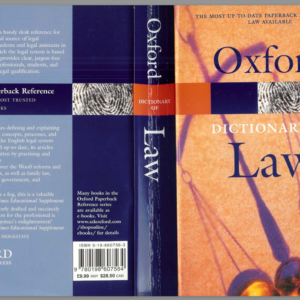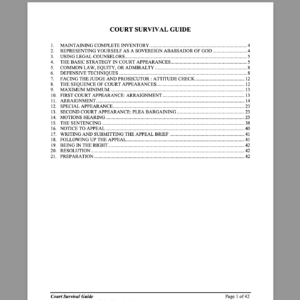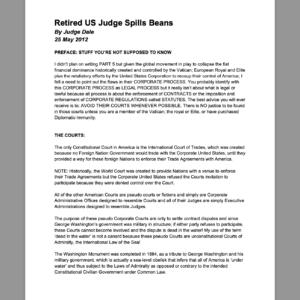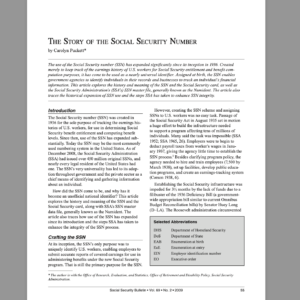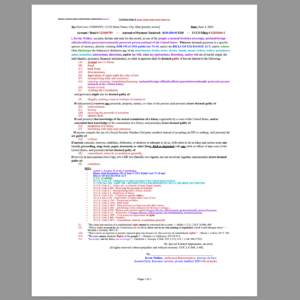How UCC §§ 1-103, 3-104, 3-601, and 3-603 Operate Across Jurisdictions
The Uniform Commercial Code (UCC) is the backbone of commercial law in the United States. It governs transactions involving negotiable instruments, payment obligations, and contract enforcement. However, because the UCC is not federal law but adopted by each state individually, it’s critical to understand where to find its authority within your state’s statutes.
This article breaks down the codified location of four key UCC provisions in every U.S. jurisdiction:
-
UCC § 1-103 – Construction, Purpose, and Supplementation: Incorporating Principles of Equity, Common Law, and the Law Merchant
-
UCC § 3-104 – Definition and Requirements of a Negotiable Instrument
-
UCC § 3-601 – Discharge of Obligation
Each provision plays a vital role in debt discharge, contract enforcement, and commercial remedy.
I. UCC § 1-103: Commercial Law Is Built on Equity, Custom, and Common Law
UCC § 1-103 provides the interpretive backbone for all other UCC provisions. It mandates a liberal construction of the Code’s terms and affirms that unless displaced by a specific UCC provision, the following bodies of law remain fully enforceable:
-
Common law contract doctrines
-
The Law Merchant
-
Doctrines such as fraud, duress, coercion, mistake, estoppel, misrepresentation, and bankruptcy
Strategic importance: This section empowers litigants to invoke equity, maxims of law, and contract principles in tandem with commercial remedies. It forms the legal justification to apply ancient principles like “He who fails to assert his rights has none.”
Codified in all 50 states, as follows: : Ala. Code § 7-1-103, Alaska Stat. § 45.01.103, A.R.S. § 47-1103, Ark. Code § 4-1-103, Cal. Com. Code § 1103, C.R.S. § 4-1-103, Conn. Gen. Stat. § 42a-1-103, 6 Del. C. § 1-103, Fla. Stat. § 671.103, O.C.G.A. § 11-1-103, Haw. Rev. Stat. § 490:1-103, Idaho Code § 28-1-103, 810 ILCS 5/1-103, Ind. Code § 26-1-1-103, Iowa Code § 554.1103, Kan. Stat. § 84-1-103, Ky. Rev. Stat. § 355.1-103, La. R.S. § 10:1-103, 11 M.R.S. § 1-103, Md. Code, Com. Law § 1-103, Mass. Gen. Laws ch. 106, § 1-103, Mich. Comp. Laws § 440.1103, Minn. Stat. § 336.1-103, Miss. Code § 75-1-103, Mo. Rev. Stat. § 400.1-103, Mont. Code § 30-1-103, Neb. Rev. Stat. § 1-103, Nev. Rev. Stat. § 104.1103, N.H. Rev. Stat. § 382-A:1-103, N.J. Stat. § 12A:1-103, N.M. Stat. § 55-1-103, N.Y. U.C.C. Law § 1-103, N.C. Gen. Stat. § 25-1-103, N.D. Cent. Code § 41-01-03, Ohio Rev. Code § 1301.103, Okla. Stat. tit. 12A, § 1-103, Or. Rev. Stat. § 71.1030, 13 Pa. C.S. § 1103, R.I. Gen. Laws § 6A-1-103, S.C. Code § 36-1-103, S.D. Codified Laws § 57A-1-103, Tenn. Code § 47-1-103, Tex. Bus. & Com. Code § 1.103, Utah Code § 70A-1a-103, 9A V.S.A. § 1-103, Va. Code § 8.1A-103, Rev. Code Wash. § 62A.1-103, W. Va. Code § 46-1-103, Wis. Stat. § 401.103, and Wyo. Stat. § 34.1-1-103.
II. UCC § 3-104: The Blueprint of a Negotiable Instrument
This section defines the legal requirements for a document to qualify as a negotiable instrument, i.e., one that can serve as lawful tender for discharge of obligations. Key criteria include:
-
A fixed amount of money
-
Payable to order or bearer
-
Payable on demand or at a definite time
-
Contains no additional undertakings beyond payment
Strategic importance: This is the foundation for asserting that a properly constructed instrument—such as a Bill of Exchange, Promissory Note, or Bond—constitutes valid commercial tender when issued in accordance with law.
Codified in all 50 states, as follows: : Ala. Code § 7-3-104, Alaska Stat. § 45.03.104, Ariz. Rev. Stat. Ann. § 47-3104, Ark. Code Ann. § 4-3-104, Cal. Com. Code § 3104, Colo. Rev. Stat. § 4-3-104, Conn. Gen. Stat. § 42a-3-104, Del. Code Ann. tit. 6, § 3-104, Fla. Stat. § 673.1041, Ga. Code Ann. § 11-3-104, Haw. Rev. Stat. § 490:3-104, Idaho Code § 28-3-104, 810 Ill. Comp. Stat. 5/3-104, Ind. Code § 26-1-3.1-104, Iowa Code § 554.3104, Kan. Stat. Ann. § 84-3-104, Ky. Rev. Stat. Ann. § 355.3-104, La. Stat. Rev. § 10:3-104, Me. Rev. Stat. tit. 11, § 3-104, Md. Code Ann., Com. Law § 3-104, Mass. Gen. Laws ch. 106, § 3-104, Mich. Comp. Laws § 440.3104, Minn. Stat. § 336.3-104, Miss. Code Ann. § 75-3-104, Mo. Rev. Stat. § 400.3-104, Mont. Code Ann. § 30-3-104, Neb. Rev. Stat. § 3-104, Nev. Rev. Stat. § 104.3104, N.H. Rev. Stat. Ann. § 382-A:3-104, N.J. Stat. Ann. § 12A:3-104, N.M. Stat. Ann. § 55-3-104, N.Y. U.C.C. Law § 3-104, N.C. Gen. Stat. § 25-3-104, N.D. Cent. Code § 41-03-04, Ohio Rev. Code Ann. § 1303.03, Okla. Stat. tit. 12A, § 3-104, Or. Rev. Stat. § 73.0104, 13 Pa. Cons. Stat. § 3104, R.I. Gen. Laws § 6A-3-104, S.C. Code Ann. § 36-3-104, S.D. Codified Laws § 57A-3-104, Tenn. Code Ann. § 47-3-104, Tex. Bus. & Com. Code § 3.104, Utah Code Ann. § 70A-3-104, Vt. Stat. Ann. tit. 9A, § 3-104, Va. Code Ann. § 8.3A-104, Wash. Rev. Code § 62A.3-104, W. Va. Code § 46-3-104, Wis. Stat. § 403.104, and Wyo. Stat. Ann. § 34.1-3-104.
III. UCC § 3-601: Discharge and Its Effect
This section states that a party’s obligation on a negotiable instrument is discharged in the same way a simple contract is discharged—either by:
-
Agreement
-
Performance
-
Tender and refusal
-
Express release or cancellation
“a) The obligation of a party to pay the instrument is discharged as stated in this Article or by an act or agreement with the party which would discharge an obligation to pay money under a simple contract.
(b) Discharge of the obligation of a party is not effective against a person acquiring rights of a holder in due course of the instrument without notice of the discharge.”
Crucially, the discharge of one party does not discharge others, which is vital in layered commercial transactions involving multiple signatories.
Codified in all 50 states, as follows: Ala. Code § 7-3-601, Alaska Stat. § 45.03.601, Ariz. Rev. Stat. § 47-3601, Ark. Code § 4-3-601, Cal. Com. Code § 3601, Colo. Rev. Stat. § 4-3-601, Conn. Gen. Stat. § 42a-3-601, 6 Del. C. § 3-601, Fla. Stat. § 673.6011, O.C.G.A. § 11-3-601, Haw. Rev. Stat. § 490:3-601, Idaho Code § 28-3-601, 810 ILCS 5/3-601, Ind. Code § 26-1-3.1-601, Iowa Code § 554.3601, Kan. Stat. § 84-3-601, Ky. Rev. Stat. § 355.3-601, La. Rev. Stat. § 10:3-601, 11 Me. Rev. Stat. § 3-601, Md. Code, Com. Law § 3-601, Mass. Gen. Laws ch. 106, § 3-601, Mich. Comp. Laws § 440.3601, Minn. Stat. § 336.3-601, Miss. Code § 75-3-601, Mo. Rev. Stat. § 400.3-601, Mont. Code § 30-3-601, Neb. Rev. Stat. § 3-601, Nev. Rev. Stat. § 104.3601, N.H. Rev. Stat. § 382-A:3-601, N.J. Stat. § 12A:3-601, N.M. Stat. § 55-3-601, N.Y. U.C.C. Law § 3-601, N.C. Gen. Stat. § 25-3-601, N.D. Cent. Code § 41-03-60.1, Ohio Rev. Code § 1303.61, Okla. Stat. tit. 12A, § 3-601, Or. Rev. Stat. § 73.0601, 13 Pa. Cons. Stat. § 3601, R.I. Gen. Laws § 6A-3-601, S.C. Code § 36-3-601, S.D. Codified Laws § 57A-3-601, Tenn. Code § 47-3-601, Tex. Bus. & Com. Code § 3.601, Utah Code § 70A-3-601, 9A V.S.A. § 3-601, Va. Code § 8.3A-601, Wash. Rev. Code § 62A.3-601, W. Va. Code § 46-3-601, Wis. Stat. § 403.601, and Wyo. Stat. § 34.1-3-601.
IV. UCC § 3-603: Refusal of Tender Still Triggers Discharge
UCC § 3-603 goes even further: If payment is tendered and refused, the obligation is still discharged. This is critical in administrative processes or disputes where the creditor refuses to accept lawful tender.
“If tender of payment is made to a person entitled to enforce the instrument and the tender is refused, there is a discharge…”
Strategic importance: This codification is the legal tool used in many commercial discharge scenarios, including 1099-OID filings and administrative offsets, to establish that a debt no longer exists once valid tender is made—even if rejected.
Codified in all 50 states, as follows: : Ala. Code § 7-3-603, Alaska Stat. § 45.03.603, Ariz. Rev. Stat. Ann. § 47-3603, Ark. Code Ann. § 4-3-603, Cal. Com. Code § 3603, Colo. Rev. Stat. § 4-3-603, Conn. Gen. Stat. § 42a-3-603, 6 Del. C. § 3-603, Fla. Stat. § 673.6031, Ga. Code Ann. § 11-3-603, Haw. Rev. Stat. § 490:3-603, Idaho Code § 28-3-603, 810 Ill. Comp. Stat. 5/3-603, Ind. Code § 26-1-3.1-603, Iowa Code § 554.3603, Kan. Stat. Ann. § 84-3-603, Ky. Rev. Stat. Ann. § 355.3-603, La. Rev. Stat. Ann. § 10:3-603, Me. Rev. Stat. Ann. tit. 11, § 3-1603, Md. Code Ann., Com. Law § 3-603, Mass. Gen. Laws ch. 106, § 3-603, Mich. Comp. Laws § 440.3603, Minn. Stat. § 336.3-603, Miss. Code Ann. § 75-3-603, Mo. Rev. Stat. § 400.3-603, Mont. Code Ann. § 30-3-603, Neb. Rev. Stat. U.C.C. § 3-603, Nev. Rev. Stat. § 104.3603, N.H. Rev. Stat. Ann. § 382-A:3-603, N.J. Stat. Ann. § 12A:3-603, N.M. Stat. Ann. § 55-3-603, N.Y. U.C.C. Law § 3-603, N.C. Gen. Stat. § 25-3-603, N.D. Cent. Code § 41-03-59, Ohio Rev. Code Ann. § 1303.63, Okla. Stat. tit. 12A, § 3-603, Or. Rev. Stat. § 73.0603, 13 Pa. Cons. Stat. § 3603, R.I. Gen. Laws § 6A-3-603, S.C. Code Ann. § 36-3-603, S.D. Codified Laws § 57A-3-603, Tenn. Code Ann. § 47-3-603, Tex. Bus. & Com. Code Ann. § 3.603, Utah Code Ann. § 70A-3-603, Vt. Stat. Ann. tit. 9A, § 3-603, Va. Code Ann. § 8.3A-603, Wash. Rev. Code § 62A.3-603, W. Va. Code § 46-3-603, Wis. Stat. § 403.603, and Wyo. Stat. Ann. § 34.1-3-603.
Conclusion: Every Remedy Has a Code
These four UCC provisions form the operational heart of commercial remedy, negotiable instrument enforcement, and lawful discharge of obligations. Whether you’re executing a secured party strategy, challenging a debt, or issuing lawful tender, knowing your state’s codification gives you the statutory ground to stand on.
When used correctly, these statutes do more than support your position—they mandate that your offer be recognized under law, even if denied.




